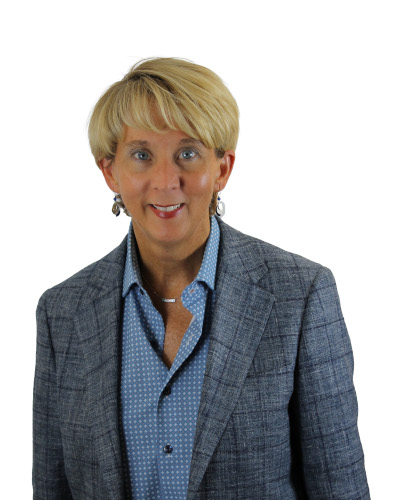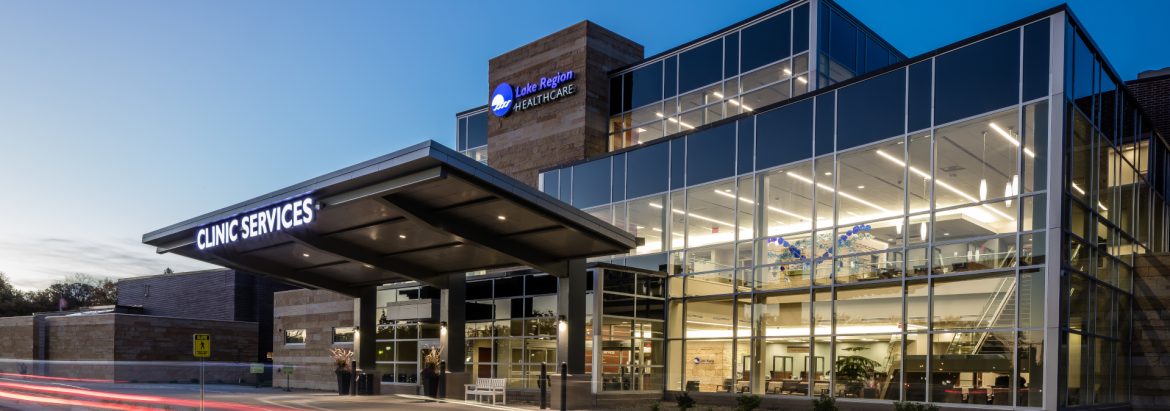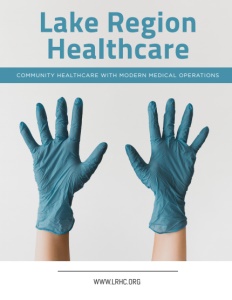Lake Region Healthcare
community healthcare with modern medical operations
Rural healthcare with a difference, Lake Region Healthcare offers residents many options
For more than 100 years Lake Region Healthcare has partnered with local communities to enrich the lives of its residents through healthcare services. Located in west central Minnesota, the enterprise serves a largely 200-square-mile rural area of Minnesota and eastern North Dakota with primary and specialty care needs ranging from obstetrics and pediatrics to plastic surgery and oncology.
Lake Region is a locally governed non-profit, community-based 501(c)(3) charitable organization that is fully independent of other healthcare systems, yet partners with regional systems such as Sanford Health offer patients a full range of services close to home and well-coordinated referrals to partner systems,, no matter what their affliction or illness is.
Today, Lake Region has a medical staff of approximately 120 providers and 1,100 employees, operating two hospitals and 10 clinic locations across its growing service territory. The organization continues to invest in providing the most up-to-date and innovative medical services and technology possible. One of its highlight facilities is a Fergus Falls based medical and radiation oncology center that helps bring those treatment services closer to patients, helping to relieve at least a small part of their stress.

Kent Mattson
“We believe that no one should be forced to drive far for such treatment,” says Lake Region Healthcare CEO Kent Mattson. “Oncology care needs to be close to home because of the impact that (disease) has on a patient and their families.”
Lake Region also manages a 64-unit assisted living home in Fergus Falls near its main campus and will continue to invest in services and facilities to support the region’s senior population.
One of the system’s most notable recent investments is a $25 million electronic health records program known as Epic, which went live in late 2022. With it, patient records are shared in a safe and efficient way within the Lake region care team and with other providers who require access. The patient also has access to information about their health history, helping to streamline the establishment of personal health plans with their care team.
According to Lake Region CFO Camie Patterson, the Epic system’s data is used by the organization to not only provide safe and quality clinical care, but also to effectively efficiently manage care. The system also allows patients and staff ease of access features with safeguards in place to protect sensitive patient information.
“It gives patients access to information and means to communicate that they didn’t have before and makes it efficient for records to be sent to specialists when there is a need,” Patterson says. “It is also a great benefit to our employees, as Epic is the leading clinical cand business software solution for an improved workplace experience.
Another of Lake Region’s recent investments is a new PET/CT unit, which is a type of medical technology that many community-based health organizations may not have. This technology combines pictures from a positron emission tomography (PET) scan and a computed tomography (CT) scan. The PET and CT scans are done at the same time with the same machine, and give more detailed pictures of areas inside the body than either scan gives by itself.
Lake Region continues to grow its collective telehealth capabilities, which began before the COVID pandemic, but really grew in demand afterward. Mattson called telehealth an important way to increase access to healthcare services now and in the future. He believes that staying on top of telehealth trends will be critical to the system’s growth in the years ahead.
Another trend that COVID accelerated is the shortage of qualified healthcare workers in certain areas, particularly with providers and nurses. Those challenges likely will exist within the healthcare sector for some time, Mattson says.
That can be especially true on the provider side for a rural-based healthcare system. Many new providers choose to work in an urban setting, and the rural lifestyle is not always desired by qualified applicants. However, Lake Region’s relatively large size and scope of services in an independent, community-based setting, and tis focus on being person-centered, gives Lake Region an edge for being a great place to give and receive care, Mattson adds.
Keeping the morale of the entire staff high is important as well, Patterson says because COVID changed the way the industry looks at a work/life balance. Working in the healthcare field always had its stressful features, but the pandemic exacerbated many of them. Even today as the worst of the COVID pandemic appears to be over, healthcare professionals are retiring earlier or leaving their practices for jobs within the insurance sector.
Staff turnover at Lake Region is not nearly as high as it is at other health systems, but it is higher than 10 years ago. Says Patterson, “we expected a shortage of medical providers and nurses even before COVID but that shortage is real and amplified in the rural areas.”
To support a work/life balance and employee satisfaction, Lake Region measures the engagement scores of all staff and providers. All our people are surveyed regularly in an effort to identify burnout before it becomes a bigger issue and to support improved workplace experiences.
“(Doctor) stability is very important for rural communities because many of our patients have lived here many years, or are from families with deep community roots,” Patterson says. “We strive to provide that sense of stability as best we can.”
COVID was a challenging time for all in healthcare but Lake Region became an even stronger organization because of it. Fortunately, Lake Region never fell into a “critical” situation where it couldn’t meet the collective needs of the community, says Mattson. It dealt with occasional virus surges while retaining a purpose-based mindset.
 Mattson, Patterson, and their colleagues on the executive team have created a master strategic plan to ensure financial stability, a high level of patient experience, best-in-class professional service, and continued system growth, among other goals. Hiring the “best and brightest leaders”with a “people first’ mindset will help Lake Region thrive despite such headwinds as staff turnover and medical equipment supply chain shortages and delays.
Mattson, Patterson, and their colleagues on the executive team have created a master strategic plan to ensure financial stability, a high level of patient experience, best-in-class professional service, and continued system growth, among other goals. Hiring the “best and brightest leaders”with a “people first’ mindset will help Lake Region thrive despite such headwinds as staff turnover and medical equipment supply chain shortages and delays.
“Healthcare is changing constantly and it requires us to be innovative in our approach to everything,” Patterson says.
This includes establishing new partnerships and protocols with third-party payers for reimbursements. It also includes creating a “space planning approach” for growth that ensures there is enough room for efficient operations and patient care as expansion continues. New services recently added, such as a new plastic and reconstructive surgery offering that is of particular interest to oncology patients, burn victims, and others who have specific medical needs.
The strategic plan helps to identify other needs, such as a new CT scanner at Fergus Falls Hospital and a new medical distribution system that will help manage the safe and secure delivery of patient pharmaceuticals.
According to Mattson, “we want to be the provider of choice for those who live within our service area.”
Community support is one of Lake Region’s six pillars of focus and philanthropic support is part of the system’s ecosystem. Healthcare is delivered locally not just through clinics and hospitals but in community educational programs and other direct outreach. “We strive to be a strong community partner and support local projects that tie back to our mission, and we’re also grateful for the generosity of our community back to us as a non-profit. The philanthropic support of our work through the Foundation and Auxiliary is both heart-warming and increasingly important to our success,” Mattson says.
To help support the ongoing staffing challenges, Lake Region works with universities like Minnesota State and North Dakota State to provide opportunities and programs for students hoping to enter the healthcare field as a profession. One example is a phlebotomy certification program that serves as a “great entry point into the healthcare system,” according to Patterson. It also offers special nursing programs and general introductions for working with a patient population in a rural setting.
“Running a (medical) practice in a rural area is much different than an urban setting, so we train (students) there as well,” Mattson says. “Providers working in a rural setting often need to provide a broader scope of services and we are well positioned to prepare them for what they will face.”
AT A GLANCE
Lake Region Healthcare
What: A leading independent provider of top-tier rural healthcare services
Where: Headquartered in Fergus Falls, MN
Website: www.lrhc.org
PREFERRED VENDORS
Bremer Bank – www.bremer.com
Bremer Financial Corporation is a privately held, regional financial services company with $16 billion in assets. Founded in 1943 by Otto Bremer, the company is headquartered in St. Paul, Minnesota, and provides a comprehensive range of banking, mortgage, investment, wealth management and insurance products and services.




